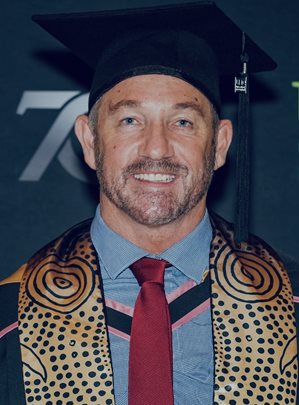Craig Raymond is the 2024 recipient of the APS Bendi Lango bursary.
Criag Raymond

Craig is a proud Wiradjuri Man who moved into the psychology field as a way to honour his Indigenous heritage (through his mother’s maternal line) and the impact that inter-generational trauma had, and has, on his own, and the wider Indigenous population as a whole. “Inter-generational trauma is real, I see it in my own family experiences”. Craig expands on this from a personal perspective, “for example, the average lifespans of my maternal Indigenous line was 10-20 years lower than my father’s non-Indigenous side. Additionally, my Indigenous family ancestors through to the present-day experienced incarceration, lower socioeconomic status, violence, abuse, denial to basic health and educational services, and the accompanying shame”. Sadly, Craig’s family history is an enduring issue for the Indigenous population, with life expectancy remaining 10-years less, and incarceration rates being 15 to 20 times more likely for the Indigenous population, with mental health illness affecting nearly half of those incarcerated.
Like many Indigenous people, it took Craig a while to understand his identity, and where he could best help and honour his ancestors and current mob. Craig reflects, “Many people have helped throughout this journey. I look back at my days in the 1990’s as a police officer and working with Governor-General Sir William Deane (Mabo Decision High Court Judge). Then fast-forwarding to today, where UNE has been very supportive of my efforts to integrate current units and Indigenous culture research, including supporting my 2023 honours project that enabled me to return to the Country of my ancestors, and now in my clinical masters, opportunities to work with Oorala and meet inspiring people such as Uncle Dr. Stan Grant.
Whilst Craig was very close to commencing a PhD in Clinical Psychology exploring the social and wellbeing model and how authorising psychologists to prescribe medication may benefit remote Indigenous communities he paused and reflected. “I realised that to be the best clinician I could be I needed to concentrate on one area at a time, either research or clinical skills. I choose to complete my master’s in clinical psychology so when I graduate, I can put all my life experiences, with my recent clinical psychological training, into working hands-on in remote and regional communities, providing much needed psychological assessments and therapy”.
Although study takes up most of Craig’s time, his part-time role as a Rugby League referee in Group 19 (Walcha to Moree, NSW), and previous coaching roles with the Waterloo Storm Indigenous Rugby League side, has guided his desire to work in multiple Indigenous communities when entering practice in 2026. “I have really enjoyed my refereeing and meeting local mob over the vast 350km Group 19 territory. I would like to model my professional practice along similar lines so I can reach many in need that may not otherwise have access to a clinical psychologist. Additionally, if I can assist others follow my career path, that will benefit mob for generations to come”. Craig’s reflection on access is quite telling with less than 1% of all registered psychologists being Indigenous, and Indigenous clinical psychologists even rarer, currently totaling under 100 (for the whole Country!).
The APS bursary is funded through generous donations from APS members. Since the launch of the Bendi Lango initiative in 2006, twenty Aboriginal and Torres Strait Islander students have been supported in their postgraduate psychology studies.
More about the Bendi Lango initiative, including previous bursary recipients and how to make an online donation.